Key challenges for enabling high-performance short-range communications in extreme propagation environments
(organized by Research Projects SNS TIMES, TERRAMETA, and 6G-SHINE)
Wednesday, November 8 2023, 10:00-13:30 Room: Heimgarten+Watzmann
Description
This Special Session will cover the overlapping topics researched within the context of three SNS JU Phase I projects: TIMES (http://times6g.eu/), TERRAMETA (https://terrameta-project.eu/), and 6G-SHINE (https://6gshine.eu/). In particular, these topics comprise:
- THz communications
- Reconfigurable Intelligent Surfaces
- Mesh networks for high frequency communications
- Wireless subnetworks
- Short range, low-power radio cells
- Integrated sensing and communications
- Channel modelling
- Hardware for high frequency communications
- Ultra-Reliable Low Latency Communications (URLLC) networks
- Communications in challenging/extreme propagation environments
This Special Session will aim at addressing the above topics in the format of: i) invited talks given by the participants in the projects; ii) a panel discussion. The invited speakers and panelists of diverse backgrounds (industry, academia, standardization) will aim at providing different perspectives on the topics related to enabling high performance communication in high frequencies and with reconfigurable intelligent surfaces. Beyond the research challenges, the Session will also discuss how the outputs of research projects can be effectively transferred to standards, paving the way to commercialization of the developed technologies.
Special Session Organizers
Mate Boban, Huawei Technologies Duesseldorf GmbH, Germany (SNS TIMES)
Luis Manuel Pessoa, INESC-TEC, Portugal (SNS TERRAMETA)
Davide Dardari, University of Bologna, Italy (SNS 6G-SHINE / SNS TIMES)
Session schedule:
10:00 – 10:10: Welcome note from the organizers, including the introduction of the participating projects (SNS TIMES, TERRAMETA, 6G-SHINE)
10:10 – 10:50: Invited Talk I “TERRAMETA – THz Reconfigurable Intelligent Surfaces for next generation communications and sensing” by Sean Ahearne, Dell EMC,Portugal
10:50 – 11:30: Invited Talk II “6G Subnetworks for Novel Applications in Automotive, Manufacturing and Beyond” by Andreas Mueller, Bosch GmbH, Germany
11:30 – 12:00: Coffee Break
12:00 – 13:30: Panel on “Key challenges for enabling high-performance short-range communications in extreme propagation environments”
Panel Moderator: Mate Boban, Huawei, Germany (SNS TIMES)
Panelists
- Sean Ahearne, Dell Technologies, Ireland (SNS TERRAMETA)
- George C. Alexandropoulos, NKUA, Greece (SNS TERRAMETA)
- Andreas Mueller, Bosch GmbH, Germany (6G-SHINE)
- Luca Sanguinetti, University of Pisa, Italy (SNS TIMES)
- Paolo Baracca, Nokia, Germany (SNS 6G-SHINE)
Bios
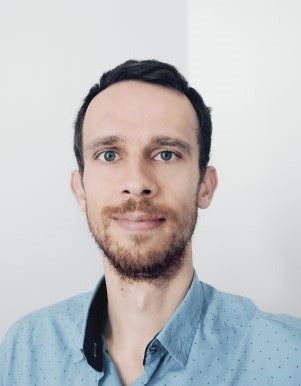 Dr. Mate Boban received the Diploma degree in informatics from the University of Zagreb and the Ph.D. degree in electrical and computer engineering from Carnegie Mellon University, in 2004 and 2012, respectively. He is a technical expert with Huawei Munich Research Center, Germany. He is a co-chair of COST INTERACT WG1 (Radio Channels) and a vice-chair of ETSI Industry Specification Group (ISG) on THz. He has co-chaired several IEEE conferences and workshops and has been actively involved in several EU-funded projects. He coauthored three papers that received the Best Paper Award, at IEEE VTC, IEEE VNC, and at EuCAP. His current research interests are in THz communications and sensing systems, channel modeling, resource allocation, and machine learning in wireless networks.
Dr. Mate Boban received the Diploma degree in informatics from the University of Zagreb and the Ph.D. degree in electrical and computer engineering from Carnegie Mellon University, in 2004 and 2012, respectively. He is a technical expert with Huawei Munich Research Center, Germany. He is a co-chair of COST INTERACT WG1 (Radio Channels) and a vice-chair of ETSI Industry Specification Group (ISG) on THz. He has co-chaired several IEEE conferences and workshops and has been actively involved in several EU-funded projects. He coauthored three papers that received the Best Paper Award, at IEEE VTC, IEEE VNC, and at EuCAP. His current research interests are in THz communications and sensing systems, channel modeling, resource allocation, and machine learning in wireless networks.
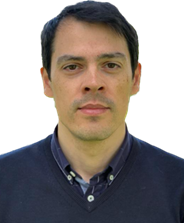 Dr. Luís Pessoa received the “Licenciatura” degree in 2006 and PhD degree in 2011, both in Electrical and Computer Engineering at the Faculty of Engineering of the University of Porto. Currently he is Senior Researcher and Manager of the Optical and Electronic Technologies (OET) group from the Centre of Telecommunications and Multimedia at INESC TEC. He is responsible for the overall coordination of the OET group, including the management of the team, the conception and management of R&D projects, coordination of research students and fostering the valorisation of research results through new contracts with industry. He has been involved in teaching of RF/microwave engineering and optical communications as an invited assistant professor at University of Porto. He has authored/co-authored 70+ publications in international conferences and journals with peer-review (including 20 journal papers and 6 book chapters) and 4 patents. He has coordinated several national and international research projects and participated in several European Union funded research projects. He is currently the Project Coordinator of the Horizon Europe CONVERGE and TERRAMETA projects that started in 2023. His main research interests include mm-wave/sub-THz electronic and opto-electronic devices, reconfigurable intelligent surfaces, antenna array reconfigurability using 2D materials (e.g. graphene) and printed electronics, RIS-enabled localisation and sensing and digital beamforming algorithms.
Dr. Luís Pessoa received the “Licenciatura” degree in 2006 and PhD degree in 2011, both in Electrical and Computer Engineering at the Faculty of Engineering of the University of Porto. Currently he is Senior Researcher and Manager of the Optical and Electronic Technologies (OET) group from the Centre of Telecommunications and Multimedia at INESC TEC. He is responsible for the overall coordination of the OET group, including the management of the team, the conception and management of R&D projects, coordination of research students and fostering the valorisation of research results through new contracts with industry. He has been involved in teaching of RF/microwave engineering and optical communications as an invited assistant professor at University of Porto. He has authored/co-authored 70+ publications in international conferences and journals with peer-review (including 20 journal papers and 6 book chapters) and 4 patents. He has coordinated several national and international research projects and participated in several European Union funded research projects. He is currently the Project Coordinator of the Horizon Europe CONVERGE and TERRAMETA projects that started in 2023. His main research interests include mm-wave/sub-THz electronic and opto-electronic devices, reconfigurable intelligent surfaces, antenna array reconfigurability using 2D materials (e.g. graphene) and printed electronics, RIS-enabled localisation and sensing and digital beamforming algorithms.
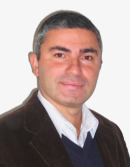 Davide Dardari is a Full Professor at the University of Bologna, Italy. He has been a Research Affiliate at the Massachusetts Institute of Technology, USA. His interests are in wireless communications, localization techniques, smart radio environments, and distributed signal processing. He received the IEEE Aerospace and Electronic Systems Society’s M. Barry Carlton Award (2011) and the IEEE Communications Society Fred W. Ellersick Prize (2012). He was the Chair of the Radio Communications Committee and a Distinguished Lecturer (2018-2019) of the IEEE Communications Society.
Davide Dardari is a Full Professor at the University of Bologna, Italy. He has been a Research Affiliate at the Massachusetts Institute of Technology, USA. His interests are in wireless communications, localization techniques, smart radio environments, and distributed signal processing. He received the IEEE Aerospace and Electronic Systems Society’s M. Barry Carlton Award (2011) and the IEEE Communications Society Fred W. Ellersick Prize (2012). He was the Chair of the Radio Communications Committee and a Distinguished Lecturer (2018-2019) of the IEEE Communications Society.
Currently, he is a Senior Member of the Editorial Board of the IEEE Signal Processing Magazine. He served as an Editor for IEEE Transactions on Wireless Communications from 2006 to 2012.
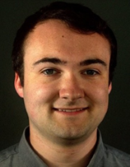 Dr. Sean Ahearne is currently a Senior Research Scientist at Dell Technologies and serves as the Technical Lead and WP Lead for a number of EU projects. With a rich background in Software Defined Networking for both optical and wireless networks, including 5G and THz, Sean has numerous published works to his name, particularly in the area of THz wireless communications. with conference papers, a book chapter, and a patent focused on the integration and utilization of THz wireless links in real-world environments. He previously played an important role in the TERAPOD project, where he successfully tested THz wireless links in a datacentre environment. Sean is now actively involved in the TERRAMETA project, working on deploying THz Reconfigurable Intelligent Surfaces (RIS) to enable flexible THz wireless links for manufacturing environments.
Dr. Sean Ahearne is currently a Senior Research Scientist at Dell Technologies and serves as the Technical Lead and WP Lead for a number of EU projects. With a rich background in Software Defined Networking for both optical and wireless networks, including 5G and THz, Sean has numerous published works to his name, particularly in the area of THz wireless communications. with conference papers, a book chapter, and a patent focused on the integration and utilization of THz wireless links in real-world environments. He previously played an important role in the TERAPOD project, where he successfully tested THz wireless links in a datacentre environment. Sean is now actively involved in the TERRAMETA project, working on deploying THz Reconfigurable Intelligent Surfaces (RIS) to enable flexible THz wireless links for manufacturing environments.
In addition to networking and THz technology, Sean has a further background and keen interest in system virtualization, AI hardware acceleration with GPUs and FPGAs, and the design and architecture of hardware and software to create powerful new infrastructure systems. With this diverse skill set and knowledge base he aims to be a multifaceted contributor to both current projects and the broader field of network and infrastructure technology.
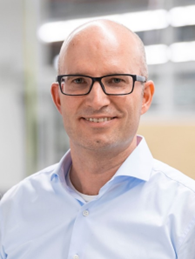 Dr. Andreas Mueller is a renowned expert at the forefront of connectivity research and 5G/6G innovation. As the leader of Bosch's strategic 6G activities across diverse business units and sites, he spearheads holistic transformative endeavors aligned with business imperatives. With his profound expertise in communication technologies for the IoT, Andreas also serves as the Chief Expert in this field. Moreover, he has held the position of General Chair of 5G-ACIA, the globally leading organization driving and shaping Industrial 5G, since its establishment in 2018. Andreas’ pivotal contributions also include coordinating and advancing Bosch's Industrial 5G undertakings over the last couple of years, focusing on key areas such as private networks, Open RAN, AI/ML, and edge computing. Equipped with a robust background in telecommunications and vertical industry applications, Andreas is uniquely positioned to drive the transformative 5G/6G-enabled revolution across various sectors.
Dr. Andreas Mueller is a renowned expert at the forefront of connectivity research and 5G/6G innovation. As the leader of Bosch's strategic 6G activities across diverse business units and sites, he spearheads holistic transformative endeavors aligned with business imperatives. With his profound expertise in communication technologies for the IoT, Andreas also serves as the Chief Expert in this field. Moreover, he has held the position of General Chair of 5G-ACIA, the globally leading organization driving and shaping Industrial 5G, since its establishment in 2018. Andreas’ pivotal contributions also include coordinating and advancing Bosch's Industrial 5G undertakings over the last couple of years, focusing on key areas such as private networks, Open RAN, AI/ML, and edge computing. Equipped with a robust background in telecommunications and vertical industry applications, Andreas is uniquely positioned to drive the transformative 5G/6G-enabled revolution across various sectors.
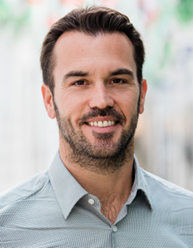 Dr. George C. Alexandropoulos received the Engineering Diploma (Integrated M.S.c), M.A.Sc., and Ph.D. degrees in Computer Engineering and Informatics from the School of Engineering, University of Patras, Greece in 2003, 2005, and 2010, respectively. He has held senior research positions at various Greek universities and research institutes, and he was a Senior Research Engineer and a Principal Researcher at the Mathematical and Algorithmic Sciences Lab, Paris Research Center, Huawei Technologies France, and at the Technology Innovation Institute, Abu Dhabi, United Arab Emirates, respectively. He is currently an Associate Professor with the Department of Informatics and Telecommunications, School of Sciences, National and Kapodistrian University of Athens (NKUA), Greece. His research interests span the general areas of algorithmic design and performance analysis for wireless networks with emphasis on multi-antenna transceiver hardware architectures, full duplex radios, active and passive Reconfigurable Intelligent Surfaces (RISs), Integrated Sensing And Communications (ISAC), millimeter wave and THz communications, as well as distributed machine learning algorithms. He currently serves as an Editor for IEEE Transactions on Communications, IEEE Transactions on Green Communications and Networking, IEEE Wireless Communications Letters, Frontiers in Communications and Networks, and the ITU Journal on Future and Evolving Technologies. Prof. Alexandropoulos is a Senior Member of the IEEE Communications, Signal Processing, Vehicular Technology, and Information Theory Societies, the vice-chair of the EURASIP Technical Area Committee on Signal Processing for Communications and Networking, as well as a registered Professional Engineer of the Technical Chamber of Greece. He is also a Distinguished Lecturer of the IEEE Communications Society. He has participated and/or technically managed more than 15 European Union (EU), international, and Greek research, innovation, and development projects. He is currently NKUA's principal investigator for the EU H2020 RISE‑6G, SNS JU TERRAMETA, SNS JU 6G-DISAC, and ESA PRISM projects dealing with RIS-empowered smart wireless environments, THz RISs, distributed ISAC, and RIS demonstration for localization and mapping, respectively. For the former project, he also serves as the dissemination manager, whereas, for the second, as the technical manager. He has received the best Ph.D. thesis award 2010, the IEEE Communications Society Best Young Professional in Industry Award 2018, the EURASIP Best Paper Award of the Journal on Wireless Communications and Networking 2021, the IEEE Marconi Prize Paper Award in Wireless Communications 2021, the Best Paper Award from the IEEE GLOBECOM 2021, and the IEEE Communications Society Fred Ellersick Prize 2023. More information is available at www.alexandropoulos.info.
Dr. George C. Alexandropoulos received the Engineering Diploma (Integrated M.S.c), M.A.Sc., and Ph.D. degrees in Computer Engineering and Informatics from the School of Engineering, University of Patras, Greece in 2003, 2005, and 2010, respectively. He has held senior research positions at various Greek universities and research institutes, and he was a Senior Research Engineer and a Principal Researcher at the Mathematical and Algorithmic Sciences Lab, Paris Research Center, Huawei Technologies France, and at the Technology Innovation Institute, Abu Dhabi, United Arab Emirates, respectively. He is currently an Associate Professor with the Department of Informatics and Telecommunications, School of Sciences, National and Kapodistrian University of Athens (NKUA), Greece. His research interests span the general areas of algorithmic design and performance analysis for wireless networks with emphasis on multi-antenna transceiver hardware architectures, full duplex radios, active and passive Reconfigurable Intelligent Surfaces (RISs), Integrated Sensing And Communications (ISAC), millimeter wave and THz communications, as well as distributed machine learning algorithms. He currently serves as an Editor for IEEE Transactions on Communications, IEEE Transactions on Green Communications and Networking, IEEE Wireless Communications Letters, Frontiers in Communications and Networks, and the ITU Journal on Future and Evolving Technologies. Prof. Alexandropoulos is a Senior Member of the IEEE Communications, Signal Processing, Vehicular Technology, and Information Theory Societies, the vice-chair of the EURASIP Technical Area Committee on Signal Processing for Communications and Networking, as well as a registered Professional Engineer of the Technical Chamber of Greece. He is also a Distinguished Lecturer of the IEEE Communications Society. He has participated and/or technically managed more than 15 European Union (EU), international, and Greek research, innovation, and development projects. He is currently NKUA's principal investigator for the EU H2020 RISE‑6G, SNS JU TERRAMETA, SNS JU 6G-DISAC, and ESA PRISM projects dealing with RIS-empowered smart wireless environments, THz RISs, distributed ISAC, and RIS demonstration for localization and mapping, respectively. For the former project, he also serves as the dissemination manager, whereas, for the second, as the technical manager. He has received the best Ph.D. thesis award 2010, the IEEE Communications Society Best Young Professional in Industry Award 2018, the EURASIP Best Paper Award of the Journal on Wireless Communications and Networking 2021, the IEEE Marconi Prize Paper Award in Wireless Communications 2021, the Best Paper Award from the IEEE GLOBECOM 2021, and the IEEE Communications Society Fred Ellersick Prize 2023. More information is available at www.alexandropoulos.info.
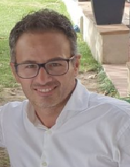 Luca Sanguinetti is a Full Professor with the Dipartimento di Ingegneria dell’Informazione, University of Pisa. He has coauthored two textbooks: ``Massive MIMO Networks: Spectral, Energy, and Hardware Efficiency’’ (2017) and ``Foundations of User-centric Cell-free Massive MIMO’’ (2020). His expertise and general interests span the areas of communications and signal processing., Dr. Sanguinetti received the Marconi Prize Paper Award in Wireless Communications in 2018 and 2022, the IEEE Communications Society Outstanding Paper Award in 2023, and coauthored a paper that received the Young Best Paper Award from the ComSoc/VTS Italy Section. He is an IEEE Senior Member. He is the coordinator of the HORIZON SNS project TIMES on THz Industrial Networks. He served as an Associate Editor for IEEE Transactions on Wireless communications and IEEE Signal Processing Letters, and as Lead Guest Editor of IEEE Journal on Selected Areas of Communications. He is currently serving as an Associate Editor for the IEEE Transactions on Communications and is a member of the Executive Editorial Committee of IEEE Transactions on Wireless Communications. He served as the Exhibit Chair of the 2014 IEEE ICASSP and as the General Co-Chair of the 2016 Tyrrhenian Workshop on 5G&Beyond. He also served as a Technical Co-Chair of EW 2018, and as Special Session Chair of ISWCS18. He was the general chair of SPAWC 2021 (Lucca, June 2021), and also the executive vice-chair of ICC 2023 (Rome, May 2023). He is the general of SPAWC2024 (Lucca, Sept. 2024).
Luca Sanguinetti is a Full Professor with the Dipartimento di Ingegneria dell’Informazione, University of Pisa. He has coauthored two textbooks: ``Massive MIMO Networks: Spectral, Energy, and Hardware Efficiency’’ (2017) and ``Foundations of User-centric Cell-free Massive MIMO’’ (2020). His expertise and general interests span the areas of communications and signal processing., Dr. Sanguinetti received the Marconi Prize Paper Award in Wireless Communications in 2018 and 2022, the IEEE Communications Society Outstanding Paper Award in 2023, and coauthored a paper that received the Young Best Paper Award from the ComSoc/VTS Italy Section. He is an IEEE Senior Member. He is the coordinator of the HORIZON SNS project TIMES on THz Industrial Networks. He served as an Associate Editor for IEEE Transactions on Wireless communications and IEEE Signal Processing Letters, and as Lead Guest Editor of IEEE Journal on Selected Areas of Communications. He is currently serving as an Associate Editor for the IEEE Transactions on Communications and is a member of the Executive Editorial Committee of IEEE Transactions on Wireless Communications. He served as the Exhibit Chair of the 2014 IEEE ICASSP and as the General Co-Chair of the 2016 Tyrrhenian Workshop on 5G&Beyond. He also served as a Technical Co-Chair of EW 2018, and as Special Session Chair of ISWCS18. He was the general chair of SPAWC 2021 (Lucca, June 2021), and also the executive vice-chair of ICC 2023 (Rome, May 2023). He is the general of SPAWC2024 (Lucca, Sept. 2024).
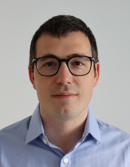 Paolo Baracca is a Senior Device Research Specialist at Nokia in Munich, Germany, since 2022. He received the B.Sc. and the M.Sc. degrees in Telecommunications Engineering in 2007 and 2009, respectively, and the Ph.D. degree in Information Engineering in 2013, all from the University of Padova, Italy. After the Ph.D. he joined Nokia Bell Labs as a Research Engineer in Stuttgart, Germany, in 2013. He has been an active contributor in several European and German funded research projects on 5G and 6G, including METIS, mmMAGIC, ONE5G and 6G-ANNA. He has also been an active contributor to 3GPP standards development. His research interests include signal processing, multi-antenna techniques and scheduling for wireless communications. He has co-authored more than 50 journal or conference papers and holds more than 80 granted or pending patents.
Paolo Baracca is a Senior Device Research Specialist at Nokia in Munich, Germany, since 2022. He received the B.Sc. and the M.Sc. degrees in Telecommunications Engineering in 2007 and 2009, respectively, and the Ph.D. degree in Information Engineering in 2013, all from the University of Padova, Italy. After the Ph.D. he joined Nokia Bell Labs as a Research Engineer in Stuttgart, Germany, in 2013. He has been an active contributor in several European and German funded research projects on 5G and 6G, including METIS, mmMAGIC, ONE5G and 6G-ANNA. He has also been an active contributor to 3GPP standards development. His research interests include signal processing, multi-antenna techniques and scheduling for wireless communications. He has co-authored more than 50 journal or conference papers and holds more than 80 granted or pending patents.






